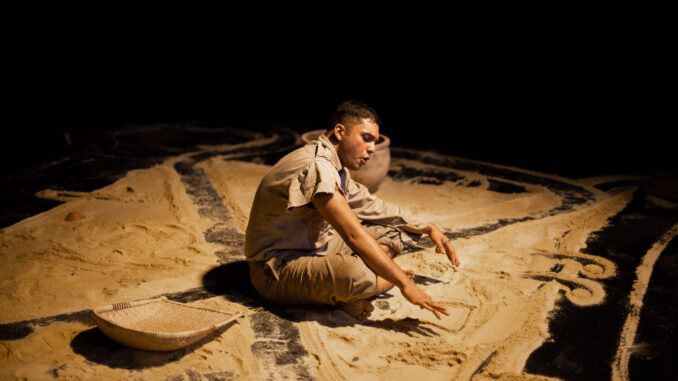
[After the Mourning, Comes… ]
Originally produced thirteen years ago by playwright and director Ahi Karunaharan, The Mourning After is a semi-autobiographical tale of what happens when the protagonist Shekar (Jehangir Homavazir) leaves New Zealand to visit his ancestral homeland of Sri Lanka in order to return his father’s ashes.
As we enter Q’s foyer, kind faces encourage us to take a cup of chai and slip off our shoes before we pad across the Q Loft’s floor. There’s something grounding about the act of curling socked feet beneath me, of nestling into my seat – it’s a welcoming, coded subtext of sharing space with family.
From the back corner, four musicians (Deeksha Vijaykumar, Senuka Sudusinghe, Isaac Smith, Tristan Carter) breathe life into the room, playing a mix of traditional and contemporary instruments which transport us to Sri Lanka’s shores.
Unassuming within the black box space, Jehangir Homavazir mingles with audience members. He is dressed in khaki shirt and trousers but is surprisingly free from other constraints of his character. Taking in the rest of the stage space, a trickle of yellow sand falls unbroken from the lighting rig and collects in a large teracotta pot sitting on a large rectangle of yellow sand. Folded on the floor are a khaki shoulder bag and explorer’s fedora – not merely a nod to Indiana Jones, but an integral plot point as we learn how the village setting was also used for Spielberg’s culturally controversial Temple of Doom film.
As the music comes to a natural conclusion, Jehangir takes his place in the centre of the sand and addresses the audience with a prologue. He introduces the musicians and explains his role in the production – breaking the fourth wall immediately sets a lighter tone which continues, somewhat unexpectedly given the subject matter, throughout the seventy-minute production.
We join Shekar as he returns to the remains of his father’s village – nearly all of which was lost in the 2004 Boxing Day tsunami. Jehangir morphs into his six relatives with ease, and his eccentric family help navigate fragments of memories. Jehangir brings a raw innocence to the role of garrulous Raju, using humorous comic timing to depict the young boy as he tries to engage his new friend Shekar. Then Jehangir becomes Auntie Saroja – the stoop of her back and downward gaze contributing to her belief that feet are a tell-tale sign of work ethic. Perhaps most convincingly, Jehangir contorts his body into the dangerous kabaragoya – a form of Asian monitor lizard. Eyes ever watchful, he assesses newcomer Shekar.
Karunaharan’s script sings with lilting phrases, as melodic as the delightfully atmospheric orchestration. Vivid wordscapes paint the lost lives and homes, and the village is remembered with precision – fingertips tracing a map through the characterful sand. Scenes bounce along with pace, reflective of Jehangir’s youthful energy, and lighting states help to create a seamless world. The use of props, delicately strewn around the sand stage space, help to place us within the village and embed us in the world. Should we need it, further cultural touchstones are added through chapter titles considerately projected onto the back wall.
Shekar’s language is loaded with poetry, but there’s a distinct absence of melancholy or overt sadness within the production. Contrary to the play’s title, the narrative does not dwell on death or ‘mourn’ in a traditional sense. The circumstances of Shekar’s father’s death do not take focus; the play overflows with life.
By retelling snippets of a lost world – through the layers of story and beneath the grains of sand – Shekar appears less encumbered by his grief. Given the universality of his human experience, this builds to profound poignancy as Shekar finally scatters his father’s ashes.
Within the silence, the weight of Shekar’s journey lays heavily on the audience – but, seemingly, not on his heart. It is profoundly beautiful – an ode to Sri Lanka, to Shekar’s father, and to Ahi’s.
A phenomenal, cathartic love story – as much for the audience as the creative team.
The Mourning After played Q Theatre 20-25 July, 2021.




Leave a Reply